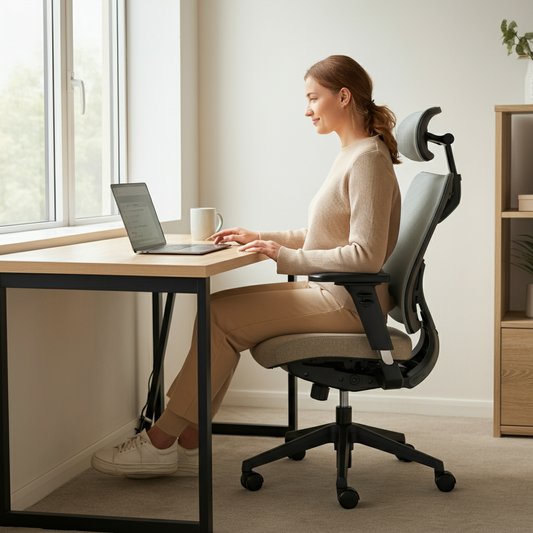When we think about ergonomic office chairs, the conversation often revolves around physical health—reducing back pain, improving posture, and preventing musculoskeletal issues. But did you know that the right ergonomic chair can also have a profound impact on your mental health? Comfort and proper support don’t just affect your body; they influence your focus, stress levels, and overall productivity. In this blog, we’ll explore the connection between ergonomic seating and mental wellbeing, backed by research and real-world examples.
The Mind-Body Connection: How Discomfort Impacts Mental Health
1. Physical Discomfort Leads to Mental Fatigue
When you’re sitting in an uncomfortable chair, your body is constantly adjusting to find a better position. This physical discomfort can drain your mental energy, leaving you feeling fatigued and less focused on your work.
2. Poor Posture Increases Stress
Slouching or sitting in an awkward position can trigger a stress response in your body. Studies have shown that poor posture can increase cortisol levels, the hormone associated with stress, making you feel more anxious and overwhelmed.
3. Chronic Pain Affects Mood
Long-term discomfort or pain caused by an ill-fitting chair can lead to irritability, frustration, and even depression. When your body is in pain, it’s hard to stay positive and motivated.
The Psychological Benefits of Ergonomic Chairs
Investing in an ergonomic office chair isn’t just about physical health—it’s about creating a workspace that supports your mental wellbeing. Here’s how ergonomic chairs can improve your mental health:
1. Enhanced Focus and Concentration
A comfortable chair allows you to sit for longer periods without distraction. When your body is properly supported, you can focus on your tasks instead of constantly shifting to find a better position.
2. Reduced Stress Levels
Ergonomic chairs promote good posture, which has been linked to lower stress levels. Sitting upright with proper lumbar support can help you feel more confident and in control, reducing feelings of anxiety.
3. Improved Mood and Productivity
When you’re comfortable and pain-free, you’re more likely to feel positive and motivated. This boost in mood can translate to higher productivity and better performance at work.
What the Research Says
1. Posture and Cognitive Performance
A study published in the journal Health Psychology found that sitting upright can improve self-esteem, reduce negative thoughts, and increase resilience to stress. Participants who maintained good posture reported feeling more alert and focused compared to those who slouched.
2. Ergonomics and Workplace Satisfaction
Research from the International Journal of Occupational Safety and Ergonomics revealed that employees who used ergonomic office chairs reported higher job satisfaction and lower stress levels. The study highlighted the importance of ergonomic interventions in promoting mental wellbeing at work.
3. Real-World Examples
At Lundia, we’ve heard countless stories from customers who experienced significant improvements in their mental health after switching to an ergonomic chair. One customer shared how their new chair helped them stay focused during long workdays, while another reported feeling less stressed and more productive.
Tips for Optimising Your Workspace for Mental Wellness
While an ergonomic chair is a great starting point, there are other ways to create a workspace that supports your mental health:
1. Adjust Your Chair Properly
- Ensure your feet rest flat on the floor, with your knees bent at a 90-degree angle.
- Position the lumbar support to align with the natural curve of your lower back.
- Adjust the armrests so your elbows are at a 90-degree angle when typing.
2. Incorporate Movement
- Take short breaks every 30-60 minutes to stretch or walk around.
- Consider using a sit-stand desk to alternate between sitting and standing throughout the day.
3. Add Personal Touches
- Decorate your workspace with items that make you happy, such as plants, photos, or artwork.
- Use soft lighting to create a calming atmosphere.
4. Minimise Distractions
- Keep your workspace organised and clutter-free.
- Use noise-cancelling headphones or play calming background music to improve focus.
Recommended Ergonomic Chairs from Lundia
At Lundia, we understand the importance of comfort and mental wellbeing in the workplace. That’s why we offer a range of ergonomic office chairs designed to support both your body and mind. Here are some of our top recommendations:
1. Lundia MindSupport™ Chair
- Features: Adjustable lumbar support, breathable mesh backrest, and 4D armrests.
- Why It’s Great: Designed to reduce stress and improve focus during long workdays.
2. Lundia ComfortPro™ Chair
- Features: High-density foam cushioning, adjustable seat depth, and a reclining backrest.
- Why It’s Great: Perfect for users who prioritise comfort and relaxation.
3. Lundia FocusFit™ Chair
- Features: Compact design, ergonomic support, and easy adjustability.
- Why It’s Great: Ideal for hybrid workers who need a versatile chair for home and office use.
Explore our full range of Ergonomic Office Chairs to find the perfect chair for your needs.
Why Comfort Matters for Mental Health
Your workspace plays a significant role in your mental wellbeing, and an ergonomic office chair is a key part of that equation. By investing in a chair that supports your body and mind, you can:
- Reduce stress and anxiety.
- Improve focus and productivity.
- Create a more positive and enjoyable work environment.




